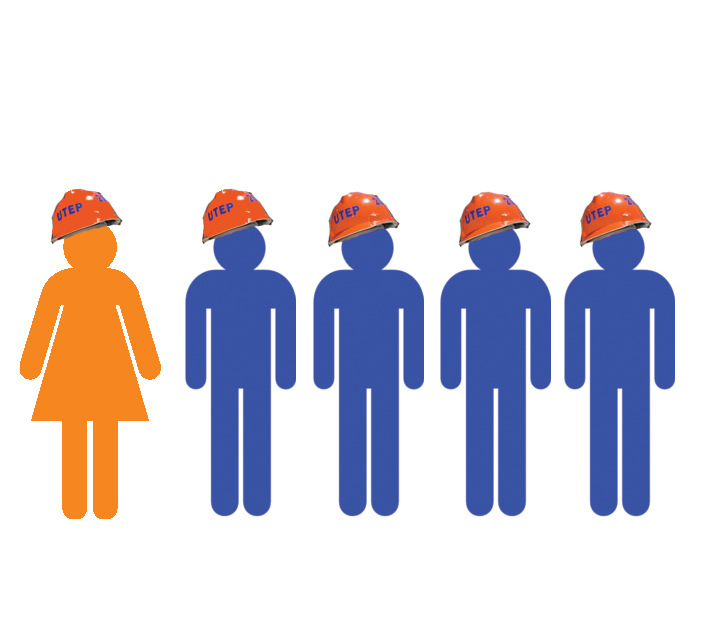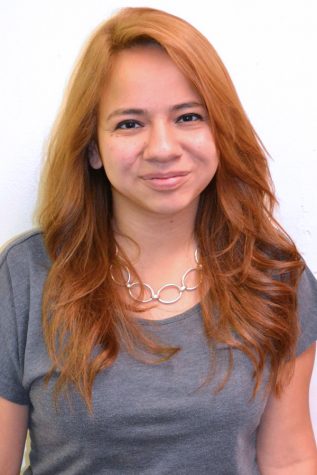Microsoft recently conducted a study that found young girls in Europe become interested in STEM subjects (Science, Technology, Engineering and Math) around age 11, but if the interest is not fully ignited in the ensuing four years, by age 15 their interest dies.
The study says a lack of role models play a part in this loss of interest.
“Role models play a big role, not just as a mentor, but role models play the part in the mentality of an individual thinking ‘oh that person did it so I can too,’” said Patricia Nava, professor and associate dean of engineering.
Nava is one of the pioneers of support organizations for women engineers at UTEP. She’s now the director of UTEP’s WIN, (Women In eNgineering). As a teaching assistant, Nava wanted to help female students in engineering. One of the reasons she was promoted to director was to help foster female engineers.
WIN is comprised of three organizations. WEST (Women’s Engineering Support Team), a venue of support for all female engineering department faculty, WIPP (Women Engineers in Professional Practice) and WINgineers, an organization for female students.
Last semester, WIN began hosting WINning Wednesdays, monthly interactive lectures conducted by female faculty and local female engineers in the industry, where items such as inclusion, anxiety and how to deal with emotions in a male-dominated field are discussed.
Nava said 20 percent of UTEP’s engineering students are female. This statistic has remained consistent for approximately 20 years. The percentage matches the average female engineer student enrollment nationwide.
“The only thing that made a big change was 40 years ago, when there was a lot of financial investment in trying to increase the number of women. That, of course, has now jumped off the radar completely,” Nava said.
Junior electrical engineering major Monserrat Salas chose to pursue electrical engineering because she always heard it was the hardest engineering concentration.
“I like challenges because I believe they train your brain and body to be better. Eventually, I ended up loving it,” Salas said.
Salas is starting to get involved with WIN and enjoyed the last lecture on March 1. She said she thinks it’s important to network with new people and you never know when they might need you or you might need them.
“It’s also important for me to join in order to meet other female students and to support each other, having only male friends can be awkward at times,” Salas said jokingly.
Senior mechanical engineering major Jocelyn Torres also chose to major in engineering because she knew she’d like the challenge.
“I’ve gotten used to the difference of men to women ratio and it doesn’t bother me. In fact, it makes me gain more confidence to prove that a woman is capable of putting ideas on the table and handling the job,” Torres said.
Miroslava Barua, WIN graduate student assistant director, plays an active role in setting up the lectures and services for WIN. She says it would be foolish for women to not prepare for certain situations in the workplace when they may deal with emotions differently.
One of the main benefits Nava and Barua have seen come out of WIN has been validating students’ fears as being more common than they think.
“Not just in engineering, in all higher education fields and it’s not restricted to women either. It’s called the imposter syndrome, where they think they’re the only ones that don’t belong or feel like they’re here, but someone is going to find out they shouldn’t be,” Nava said.
Nava says it’s not uncommon for females, even in her department, to experience discrimination working with so many males.
“Everyone has a handful of stories–how they’ve run into this head on. We had one (female) faculty member who was being treated differently and being overloaded,” Salas said. “We gave her words to use and words to stay away from and she came back to report that she had a very good exchange after being worried about the backlash. I felt that was a real win in our column on being able to provide advice.”
Although Nava said that she hopes students don’t have to go through this, she wants to provide students with tools to communicate before it can become an issue.
“I strongly believe that it is not my gender that will make me successful in engineering. It is rather the effort I put into it and my ability to problem solve,” Salas said. “It is not only guys that are smart.”
Currently, WIN is looking into starting up an executive council of students. They want to have a student representative from each engineering department that will serve as a board member for WIN.
“Our absolute goal is to empower and engage students and we’re moving toward a more distributive leadership so we can also empower them,” Nava said.












